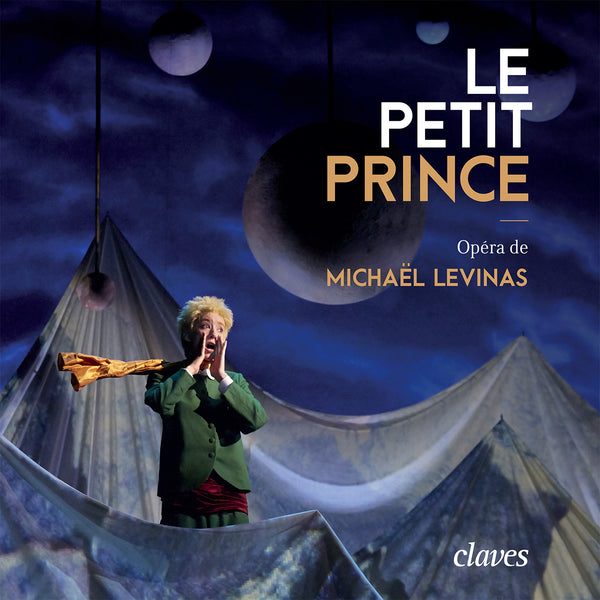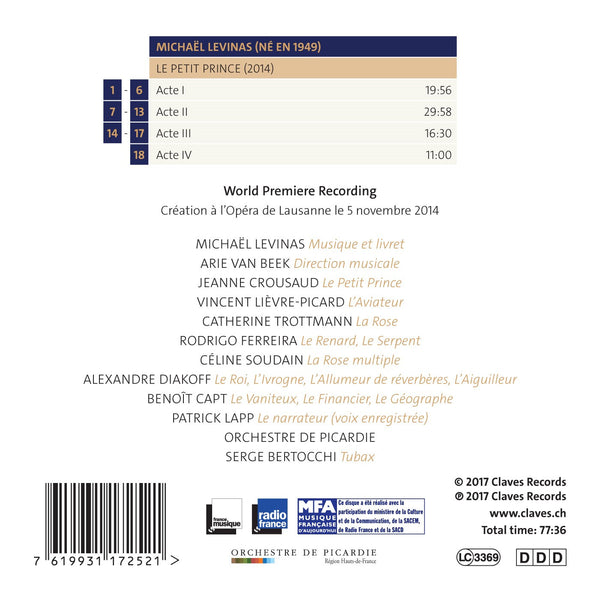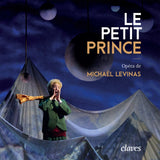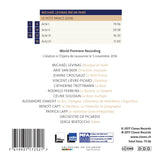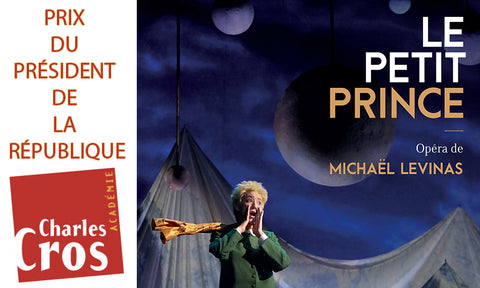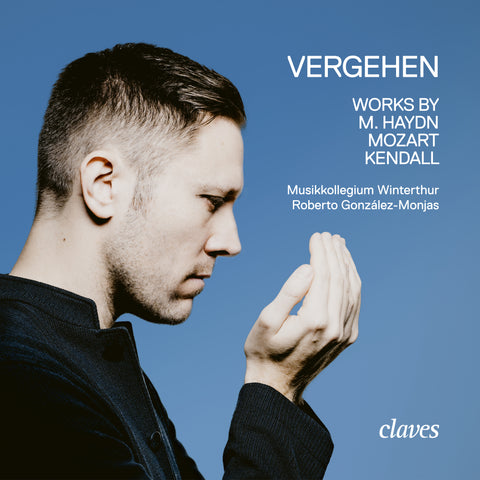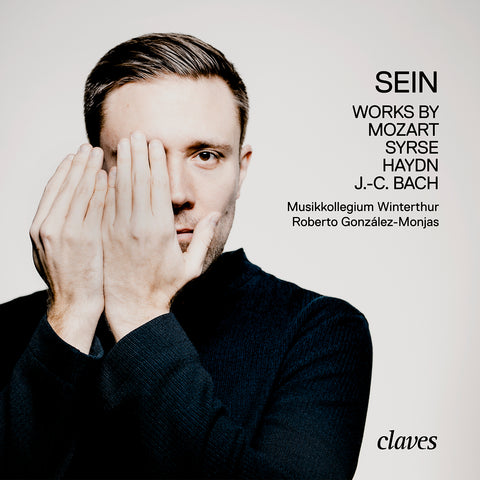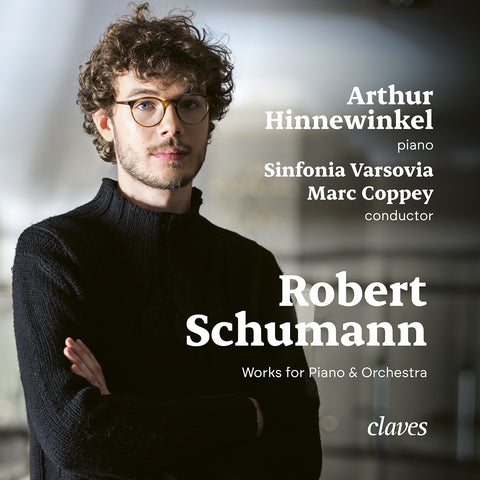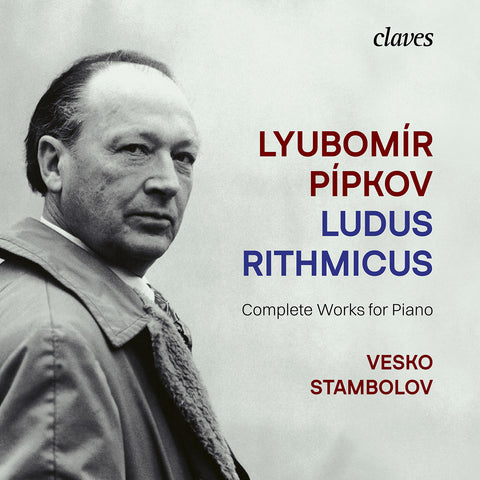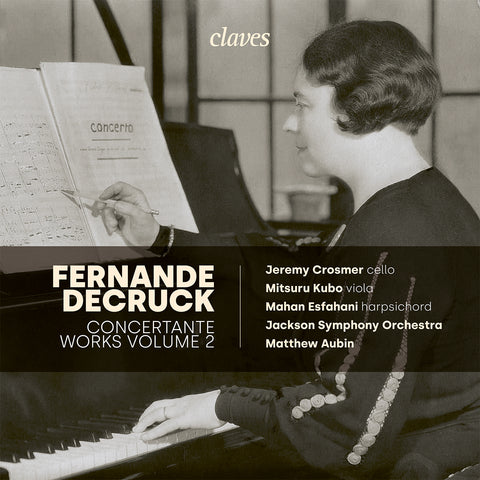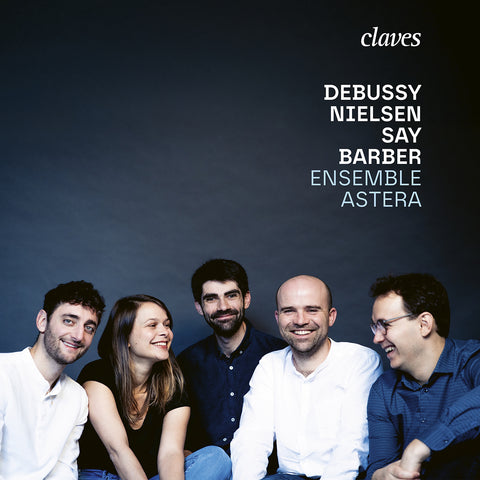(2017) Le Petit Prince - Opéra de Michaël Levinas (Antoine de Saint-Exupéry)
CD set: 1
Catalog N°:
CD 1725
Release: 16.06.2017
EAN/UPC: 7619931172521
- UPC: 191018745745
This album is now on repressing. Pre-order it at a special price now.
CHF 18.50
This album is no longer available on CD.
This album has not been released yet. Pre-order it from now.
CHF 18.50
This album is no longer available on CD.
CHF 18.50
VAT included for Switzerland & UE
Free shipping
This album is no longer available on CD.
VAT included for Switzerland & UE
Free shipping
This album is now on repressing. Pre-order it at a special price now.
CHF 18.50
This album is no longer available on CD.
This album has not been released yet.
Pre-order it at a special price now.
CHF 18.50
This album is no longer available on CD.
CHF 18.50
This album is no longer available on CD.
LE PETIT PRINCE - OPÉRA DE MICHAËL LEVINAS (ANTOINE DE SAINT-EXUPÉRY
★★★
★★★
I have always perceived music in the text of the Little Prince, this address to children, which expresses life’s graceful and transient state. Hence my positive reply to Eric Vigié, director of the Lausanne Opera, who suggested adapting the book to a lyrical work. There are already operas based on the Little Prince in Russian, English, German, but strangely enough, none in French.
What a responsibility! A unique adventure in a composer’s life! Writing an opera based on a work that is anchored in collective memory forced me to create a kind of theatricality that would be immediately perceivable and aimed at the widest audience, thus sparking off an exceptional and important bond between the public and the stage.
It is also in that respect that the project of Le Petit Prince made sense to me, from an aesthetic point of view.
Michaël Levinas
Michael Levinas
Internationally recognized in the fields of creation and interpretation, the double profile, of pianist and composer, imparts Michael Levinas a remarkable peculiarity within the French and International musical life.
Born in Paris, Michael Levinas went through the classical and high level teaching of the National Superior Conservatory of Paris, running at once studies of piano, the famous class of accompaniment, orchestra conducting and composing. In that institution he met the great musicians who made the deepest impression on him, in particular, the pianists Vlado Perlemuter, Yvonne Lefébure, but also Yvonne Loriod to whom he showed his first works. She got him immediately in Olivier Messiaen’s famous class of composing, developed also his piano repertoire and taught him the great repertoire of the XXth century, that is the one of Messiaen, but also his pupils’ works, Boulez and Stockhausen.
Besides those classical studies at the National Superior Conservatory of Paris, his musical training was marked from his very early childhood by another musical tradition, the Russian school of piano, thanks to his mother, the pianist Raissa Lévy. Coming from Moscow and Lithuania, she had studied several years in Vienna, in particular with the virtuosi and teachers Sirota, Isserlis and some other great piano masters of Central Europe. This musical tradition was also those musicians’ one, at the same time performers and creators.
Olivier Messiaen and Yvonne Loriod will encourage later Michael Levinas’ double vocation, a real demanding ascetism for a musician leading at the same time the career of composer and pianist.
At the end of his studies, trained by these two great personalities, who gave then a powerful movement of artistic revival and modernity in France and all over the world, Michael Levinas went on his first tours of pianist. Later, still encouraged by Olivier Messiaen, he was appointed as scholarship student at the Villa Medicis in Rome, directed then by the painter Balthus, another of his great encounters.
It is also the nevralgic moment when he creates in 1973, with his classmates of Messiaen’s class, Tristan Murail and Gérard Grisey, the ensemble Itinéraire, founder of the spectral movement.
Between his first works, like Arsis et Thésis (1971), Clov et Hamm (1973), Appels (1974), Froissements d’ailes (1975), Ouverture pour une fête étrange (1979), Concerto pour un piano espace (1977-1981, including his great works for orchestra, like La Cloche fêlée (1988), Par-delà (1994), Évanoui (2009) or very recently Amphithéâtre (2012), Michael Levinas is a pioneer regarding to the new ideas of the instrumental writing and the development of the sound range by the technological environments. His works for ensemble, orchestra and soloist are created and repeated by the most famous ensembles, festivals and institutions in France and abroad : Festival of Donauschingen, International meetings of de Darmstadt, Ircam, Cité de la Musique, Ensemble Inter Contemporain, Ensemble Ictus, Ensemble Itinéraire, Klang Forum, Le Balcon, Radio France, Multilatérales, Biennale de Venise…
Let us add that within the contemporary musical scene, Michael Levinas is above all characterized by an undeniable dramatic gift, a connection with the text, the theatre and the scene. Michael Levinas is well known as a composer of operas and was commissioned by important European theatres. Since La Conférence des oiseaux (1985), he wrote not less than three great lyrical works, all of them created in important European theatres : Go-gol (1996), adapted from Gogol’s novel, (Le Manteau) ; Les Nègres, adapted from Jean Genêt’s text ; La Métamorphose (2010), adapted from Kafka’s story. This closeness with the text, literature, poetry is central to the close relation which Michael Levinas maintained all his life with his father, the philosopher Emmanuel Levinas, who passed on to him the taste of languages, thought, risk, interpretation and writing.
A new opera, adapted from Saint Exupéry’s Le Petit Prince (commissioned by both operas of Lausanne and Lille) will be created in 2015 in these two theatres as well as in the Grand Théâtre de Genève, the Chatelet in Paris, and then in Liège.
Michael Levinas’ career as a concert pianist is also significant by his choice of repertoire Discovered very soon by his recording of Schumann’s Kreisleriana and Fantasy, which was acclaimed from the press, he signed a contract with Lucien Ades, thanks to which he was the first French performer of his generation after Yves Nat to record the complete set of Beethoven’s 32 Sonatas.
Some years later, Michael Levinas will record the complete set of J.-S. Bach’s Well- tempered Clavier on a modern piano.
Michael Levinas pursued an international career of pianist with this repertoire to which he often joins works of the end of the XXth century.
If Michael Levinas excels in the classical and romantic German repertoire, and thus may be considered as a “Beethovenian”, in the great tradition of the XXth century pianists, he also recorded several CDs with French music and the contemporary repertoire (Debussy, Messiaen, Ligeti, Boulez…). His whole discography is at Universal Musique, who wanted to enhance Michael Levinas’ double career, of pianist and composer, with the production of a presentation box entitled « Double-Face » (2011), including extracts of his discography.
Michael Levinas teaches at the National Superior Conservatory of Music of Paris and is Member of the Beaux-Arts Academie of the Institut de France.
★★★
★★★
I have always perceived music in the text of the Little Prince, this address to children, which expresses life’s graceful and transient state. Hence my positive reply to Eric Vigié, director of the Lausanne Opera, who suggested adapting the book to a lyrical work. There are already operas based on the Little Prince in Russian, English, German, but strangely enough, none in French.
What a responsibility! A unique adventure in a composer’s life! Writing an opera based on a work that is anchored in collective memory forced me to create a kind of theatricality that would be immediately perceivable and aimed at the widest audience, thus sparking off an exceptional and important bond between the public and the stage.
It is also in that respect that the project of Le Petit Prince made sense to me, from an aesthetic point of view.
Michaël Levinas
Michael Levinas
Internationally recognized in the fields of creation and interpretation, the double profile, of pianist and composer, imparts Michael Levinas a remarkable peculiarity within the French and International musical life.
Born in Paris, Michael Levinas went through the classical and high level teaching of the National Superior Conservatory of Paris, running at once studies of piano, the famous class of accompaniment, orchestra conducting and composing. In that institution he met the great musicians who made the deepest impression on him, in particular, the pianists Vlado Perlemuter, Yvonne Lefébure, but also Yvonne Loriod to whom he showed his first works. She got him immediately in Olivier Messiaen’s famous class of composing, developed also his piano repertoire and taught him the great repertoire of the XXth century, that is the one of Messiaen, but also his pupils’ works, Boulez and Stockhausen.
Besides those classical studies at the National Superior Conservatory of Paris, his musical training was marked from his very early childhood by another musical tradition, the Russian school of piano, thanks to his mother, the pianist Raissa Lévy. Coming from Moscow and Lithuania, she had studied several years in Vienna, in particular with the virtuosi and teachers Sirota, Isserlis and some other great piano masters of Central Europe. This musical tradition was also those musicians’ one, at the same time performers and creators.
Olivier Messiaen and Yvonne Loriod will encourage later Michael Levinas’ double vocation, a real demanding ascetism for a musician leading at the same time the career of composer and pianist.
At the end of his studies, trained by these two great personalities, who gave then a powerful movement of artistic revival and modernity in France and all over the world, Michael Levinas went on his first tours of pianist. Later, still encouraged by Olivier Messiaen, he was appointed as scholarship student at the Villa Medicis in Rome, directed then by the painter Balthus, another of his great encounters.
It is also the nevralgic moment when he creates in 1973, with his classmates of Messiaen’s class, Tristan Murail and Gérard Grisey, the ensemble Itinéraire, founder of the spectral movement.
Between his first works, like Arsis et Thésis (1971), Clov et Hamm (1973), Appels (1974), Froissements d’ailes (1975), Ouverture pour une fête étrange (1979), Concerto pour un piano espace (1977-1981, including his great works for orchestra, like La Cloche fêlée (1988), Par-delà (1994), Évanoui (2009) or very recently Amphithéâtre (2012), Michael Levinas is a pioneer regarding to the new ideas of the instrumental writing and the development of the sound range by the technological environments. His works for ensemble, orchestra and soloist are created and repeated by the most famous ensembles, festivals and institutions in France and abroad : Festival of Donauschingen, International meetings of de Darmstadt, Ircam, Cité de la Musique, Ensemble Inter Contemporain, Ensemble Ictus, Ensemble Itinéraire, Klang Forum, Le Balcon, Radio France, Multilatérales, Biennale de Venise…
Let us add that within the contemporary musical scene, Michael Levinas is above all characterized by an undeniable dramatic gift, a connection with the text, the theatre and the scene. Michael Levinas is well known as a composer of operas and was commissioned by important European theatres. Since La Conférence des oiseaux (1985), he wrote not less than three great lyrical works, all of them created in important European theatres : Go-gol (1996), adapted from Gogol’s novel, (Le Manteau) ; Les Nègres, adapted from Jean Genêt’s text ; La Métamorphose (2010), adapted from Kafka’s story. This closeness with the text, literature, poetry is central to the close relation which Michael Levinas maintained all his life with his father, the philosopher Emmanuel Levinas, who passed on to him the taste of languages, thought, risk, interpretation and writing.
A new opera, adapted from Saint Exupéry’s Le Petit Prince (commissioned by both operas of Lausanne and Lille) will be created in 2015 in these two theatres as well as in the Grand Théâtre de Genève, the Chatelet in Paris, and then in Liège.
Michael Levinas’ career as a concert pianist is also significant by his choice of repertoire Discovered very soon by his recording of Schumann’s Kreisleriana and Fantasy, which was acclaimed from the press, he signed a contract with Lucien Ades, thanks to which he was the first French performer of his generation after Yves Nat to record the complete set of Beethoven’s 32 Sonatas.
Some years later, Michael Levinas will record the complete set of J.-S. Bach’s Well- tempered Clavier on a modern piano.
Michael Levinas pursued an international career of pianist with this repertoire to which he often joins works of the end of the XXth century.
If Michael Levinas excels in the classical and romantic German repertoire, and thus may be considered as a “Beethovenian”, in the great tradition of the XXth century pianists, he also recorded several CDs with French music and the contemporary repertoire (Debussy, Messiaen, Ligeti, Boulez…). His whole discography is at Universal Musique, who wanted to enhance Michael Levinas’ double career, of pianist and composer, with the production of a presentation box entitled « Double-Face » (2011), including extracts of his discography.
Michael Levinas teaches at the National Superior Conservatory of Music of Paris and is Member of the Beaux-Arts Academie of the Institut de France.
Return to the album | Read the booklet | Main Artist: Arie van Beek







